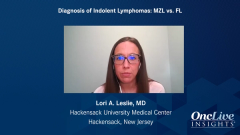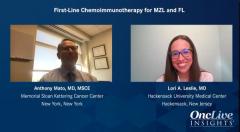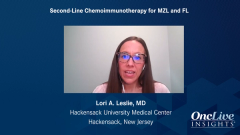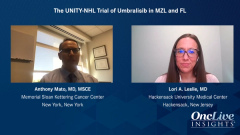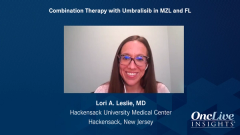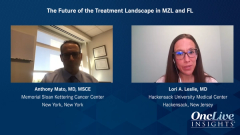
Second-Line Chemoimmunotherapy for MZL and FL
Anthony Mato, MD, MSCE, and Lori A. Leslie, MD, consider treatment options for patients with relapsed/refractory disease after first-line chemoimmunotherapy.
Episodes in this series

Anthony Mato, MD, MSCE: Let’s talk about second-line therapies. I don’t want to spend a lot of time creating a laundry list of therapies, but let’s hit on ibrutinib and R-squared [rituximab and lenalidomide] in particular in terms of utility for these patient populations. Are you using them? Where does ibrutinib fit in for you? For follicular lymphoma [FL], that’s an easy question. You are probably not using it. But for patients with marginal zone lymphoma [MZL], is that a standard go-to in the second line for you?
Lori A. Leslie, MD: Yes. I make the point to try to bring in a lot of marginal zone clinical trials because it’s such an area of unmet need. If a patient had chemoimmunotherapy, then ibrutinib-based therapy is a go-to second-line treatment option for marginal zone lymphoma. We joke a little about the suggestion for ibrutinib in follicular lymphoma being easy because it’s not approved and not particularly effective. I don’t use it there, but I do see some off-label use in patients with follicular lymphoma. I wonder if that’s because it’s effective in CLL [chronic lymphocytic leukemia], marginal zone, mantle cell lymphoma, and Waldenstrom, that it’s easy to mix that up. What about you?
Anthony Mato, MD, MSCE: I agree with you. I haven’t recently paid much attention to the BTK inhibitors in follicular lymphoma because I don’t think it’s a super exciting area at the moment. The data have never been overwhelmingly positive. Appropriately, there is no label for a BTK inhibitor—ibrutinib, acalabrutinib, and zanubrutinib—here, whereas they are labeled in some other diseases. In marginal zone, it’s a very reasonable option and is active enough that it’s being studied in the frontline setting. We might even see it approved sometime.
What about R-squared [rituximab and lenalidomide] in follicular lymphoma? Does it play a role for you in first relapse? I know it may even play a role as a first therapy, but let’s stick to relapsed disease.
Lori A. Leslie, MD: R-squared [rituximab and lenalidomide] has been in the NCCN [National Comprehensive Cancer Network] guidelines for a few years for consideration of upfront and relapsed/refractory therapy. The AUGMENT study, which led to FDA approval in November of 2019, looked at R [rituximab] vs R-squared [rituximab and lenalidomide] in rituximab-sensitive patients with at least 1 prior line of therapy. The result of the trial was pretty obvious. R-squared [rituximab and lenalidomide] was better than R [rituximab] alone in PFS [progression-free survival], time to next treatment, with even a suggestion of overall survival. The overall survival end point convinced me that I should be using R-squared [rituximab and lenalidomide] earlier in the treatment landscape. Is adding the immunomodulatory drug early in follicular lymphoma somehow changing the biology of the disease later? Maybe I have been using it a lot because I trained with Nathan Fowler, MD, at The University of Texas MD Anderson Cancer Center who is a big R-squared [rituximab and lenalidomide] fan. More recently, I need a reason to not pick R-squared [rituximab and lenalidomide] as a second-line therapy for the majority of patients with FL. Of course, that is assuming the patient didn’t get it in the frontline setting.
Anthony Mato, MD, MSCE: I agree with that. It’s a very active agent. It is probably underutilized to a certain extent across B-cell lymphoma at this point. Follicular lymphoma is the key disease where if there is going to be a use for lenalidomide, that would be the space to do it.
Transcript Edited for Clarity


